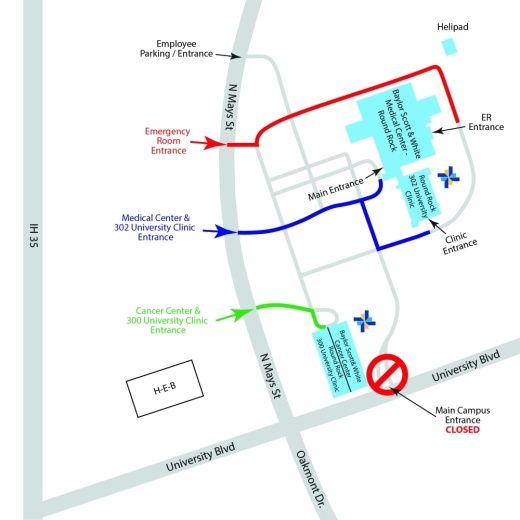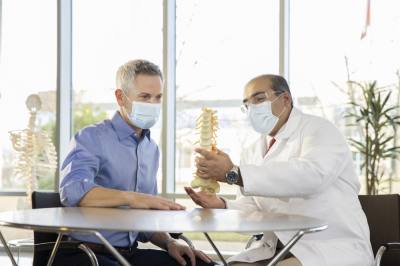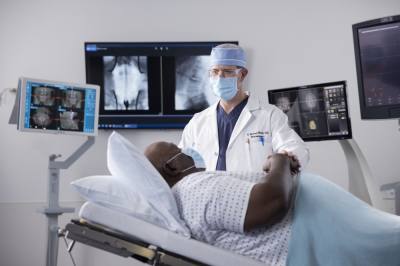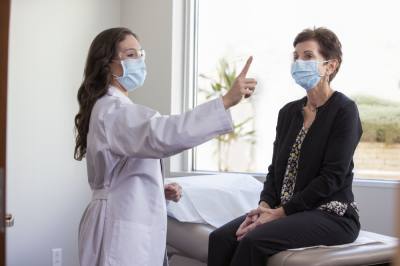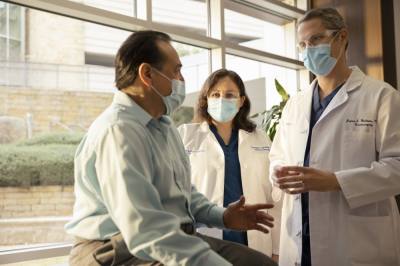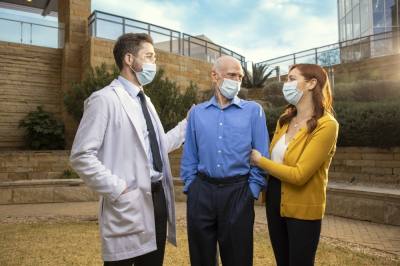If you’re headed to Baylor Scott & White Medical Center – Round Rock this year, you may need to take a different route. For the next few months, the main entrance on University Boulevard will be closed as crews from the city of Round Rock work on the road.
You can still get into the buildings on campus from three other entrances on North Mays Street. Just look for the signs to reach your final destination.
But even though you will need to plan a little extra time for your trip, it will be worth the wait. Baylor Scott & White is ready to serve you, including the team at the new NeuroHealth Institute.
Introducing the NeuroHealth Institute
The NeuroHealth Institute combines multidisciplinary experts who treat spine and neurological conditions such as seizures, chronic pain and movement disorders into one comprehensive model. The collaborative approach allows patients to benefit from a team of Baylor Scott & White specialists working together on every case.
“We know that a multidisciplinary approach can improve patient outcomes, and we’ve seen this, for example, with cancer care — where you have oncologists, surgeons and other specialists surrounding the patient with everything the patient needs to manage his or her disease,” said Rob Watson, MD, chief medical officer for Baylor Scott & White Health Austin/Round Rock and Hill Country Regions. “The NeuroHealth Institute is the same model for people with spine and neurological concerns. It’s multifaceted, coordinated and highly collaborative.”
Supported by a group of providers who specialize in neurology, surgery and other fields, the comprehensive nature of the NeuroHealth Institute means that patients can receive all their care from Baylor Scott & White — without having to make appointments outside of the health system. From diagnosis to treatment, the team manages all aspects of care locally.
“A lot of the time neurological conditions can be very complex,” Dr. Watson said. “Having to coordinate multiple appointments with different doctors and locations introduces a whole new level of stress, and we want to remove that burden from patients. When we coordinate that care for people, it allows them to focus on getting better.”
As another benefit, the NeuroHealth Institute operates from a shared medical record system, which fosters collaboration among providers and moves the record-keeping responsibility off of patients.
“People often wonder: ‘Did my neurologist talk with my neurosurgeon? Did they both check with my physical therapist?’” Dr. Watson said. “Having a shared record means that the whole care team can communicate with each other and stay up to date on the treatment plan so that we can deliver quality care.”
Innovation, Close to Home
Conditions treated by the NeuroHealth Institute span a range of disorders, including Parkinson’s disease, epilepsy, dementia, Alzheimer’s disease, migraines, multiple sclerosis, and fibromyalgia. Treatments include a variety of innovative surgical and non-surgical solutions.
Deep brain stimulation (DBS), a procedure aimed to reduce tremors for patients with movement disorders, is among the NeuroHealth Institute’s wide range of capabilities. The surgery involves sending signals to the brain through a small device called a neurostimulator. Baylor Scott & White Medical Center – Lakeway is the only facility in Central Texas to perform the DBS procedure while the patient sleeps. This provides a more comfortable and safe treatment experience.
DBS is also an FDA-approved treatment for epilepsy, a common neurological disorder that can cause seizures. The team at the NeuroHealth Institute uses a variety of approaches for patients with the condition. With epilepsy and similar disorders, innovative techniques also include diagnostic procedures to differentiate seizures linked to an underlying condition with convulsions that stem from other reasons.
“About 1 in 10 people will have a seizure in their lifetime, but it doesn’t mean everyone has epilepsy,” said Jess David Collins, MD, a neurologist and epilepsy specialist on the medical staff at Baylor Scott & White Medical Center – Round Rock. “Sometimes, it’s for a temporary reason, like you fall and hit your head or you have a high fever. But the only way to figure out what’s wrong may be to record the episode while it’s happening. For that, special brainwave testing and monitoring, either conducted at home or in a clinic, are needed to track seizures in real time.”
Once a diagnosis is confirmed, the team at the NeuroHealth Institute gets right to work.
“There are 30 medications approved to treat epilepsy, but it doesn’t mean there is a need to use them all,” he said. “Some people do great on medication with no problems. Others may need different approaches like stimulation technology or brain surgery, but they can still get their conditions better controlled.”
If you’re not already diagnosed with a neurological disorder and are wondering whether you may need to see a specialist, check with your primary care doctor for a physical exam and a referral if necessary. Learn more at www.bswhealth.com/neurohealth. For turn-by-turn alternate driving directions to the campus during the road construction project, visit bswhealth.com/roundrock.
Physicians provide clinical services as members of the medical staff at one of Baylor Scott & White Health’s subsidiary, community or affiliated medical centers and do not provide clinical services as employees or agents of those medical centers or Baylor Scott & White Health.
Select your community
Support Us
News
- Austin Metro
-
Houston Metro
- Houston Metro Home
- Bay Area
- Bellaire | Meyerland | West University
- Conroe | Montgomery
- Cy-Fair | Jersey Village
- Cypress
- Heights | River Oaks | Montrose
- Katy | Fulshear
- Lake Houston | Humble | Kingwood
- New Caney | Porter
- Pearland | Friendswood | Manvel
- Spring | Klein
- Sugar Land | Missouri City
- The Woodlands
- Tomball | Magnolia
- Dallas | Fort Worth Metro
- San Antonio Metro




